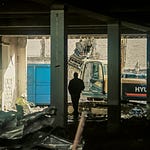We’re back this week with the writer and publisher Lomez, who will help us sort through President Trump’s blizzard of executive orders. We also discuss the controversial New York Magazine coverage of the Right’s Inauguration celebrations and a strange cult of transgender computer engineers who are allegedly involved in a string of murders. All that and more in this week’s podcast.
The following transcript has been lightly edited for clarity.
Rufo: This has been, I mean, an immense couple of weeks. I know that as we were talking leading up to the Inauguration, there was this open question of what is it going to be. Is this going to be Trump 1.0 recycled? Is the Left going to riot and blitz through the streets? Is he going to actually take action on all these promises he’s made? The answer, at least from my perspective, has been overwhelmingly all of the above, yes.
I watched the planning for this over the last few years with friends who were in the first administration and had been in Trump’s orbit planning for the potential second administration. But it still came as a shock, even though I in some ways knew what was coming. How did you see it? I mean, what has your big takeaway or reaction from the last week?
Lomez: This has been a period of 10 days since the Inauguration of as heightened and focused political energy as I’ve ever seen in this country with one exception, and it’s this exact same period eight years ago in 2017—but it was the exact opposite, which is the Left activating itself to fight back against literally everything that Trump was doing. If you go back and just read through the Wikipedia articles about what was happening at this time eight years ago, there were protests every day, millions of people in the streets. This is when the hashtag “Resistance” starts. This is when the Women’s March is happening in cities across the country. I looked it up: so the Washington Post, it was Feb. 17 that they unveiled “Democracy Dies in Darkness,” their big Resistance hashtag, and their anti-Trump rebranding. You have the beginnings, really, of the formal Russiagate scandal. At this point, it was the 17 agencies signing off telling us that Russia interfered in our election, which is, of course, meant to justify all of this leftist energy to neuter anything Trump might do as a political matter.
What’s happened now is that is gone. That is completely gone. It’s completely absent from the discourse. I am curious to hear what you think about this. I mean, I sort of saw this coming previously. My hunch was before the election that the Left was out of energy. These activist groups did not have the ability to coordinate or activate their people on the ground who would show up in the freezing cold. They’re just out of ideas. Nobody really cares. I don’t want to skip too far ahead, but this is what Curtis Yarvin wrote about in his essay, which is the difference now, and why he was wrong and you were right—we’ll get into that—is because the Left is out of energy. They’re lacking this moral energy.
I think there’s some other stuff going on. It’s not just that the Left has been deactivated. There’s something different in character about this Trump administration. It’s the administration of you can just do things and they’re just doing things. But obviously, there’s been a ton of planning that’s gone into this, a ton of foresight. I don’t know if it’s Stephen Miller or who are the people responsible for being ready to seize this moment, but they’ve obviously been preparing for a long time. The moment the Inauguration happened, they immediately went into action.
This has been something I’ve never seen on the Right. It makes me wonder what Republicans have been doing my entire life up until now. What’s the difference? What do you think the essential difference is between Trump’s administration at this point in his inner circle and why they’ve been so effective in these last 10 days versus 2017?
Rufo: First, I think you’re right on the inversion of political energy. It’s so funny, I really worked on two projects since the summer. One was this project of preparing a policy vision and agenda and working with people if there were to be a second Trump administration. But the other, smaller project I was working on, I had a patron provide some generous support for hiring a team of ex-CIA and ex-FBI analysts. They were essentially doing the initial research for some reporting on the left-wing militant groups around D.C. The thesis from our team essentially was that if there’s a contested election and this contested election spills over into a physical contestation in D.C., riots, conflicts, etc., the Left has a built-in advantage because the Left has an organized protest network. We wanted to trace the funding, organization, personalities, and potential force projection of these groups.
We had these guys studying it. Then I did some reporting and had another reporter working on it. It was this big apparatus that we were able to uncover. Then seemingly, it disappeared. It dissipated. They couldn’t mobilize anyone. It’s interesting because you have these formal institutions on the Left and organizations and training and rhetoric, but they’re almost entirely dependent on public energy. In 2016 or 2020, they were able to ride the wave. But when that energy dissipates, it’s a totally different story.
On the Trump side, I think certainly it’s Stephen Miller. It’s a lot of the people at the America First Policy Institute, which was chaired by Linda McMahon, now Education Secretary. But they had a huge team, and essentially it was an administration in waiting. These guys were there doing the detailed planning, policy writing, and workshopping ideas. Then, of course, Russ Vought’s group—he’s now the director of the Office of Management and Budget—he had a group called Center for Renewing America. His whole focus was, ‘How do we get rid of the woke and weaponized bureaucracy?’
This group of people, who were really thrust together in the first term in a totally chaotic manner, had a chance to retreat, regroup, and start actually planning. The question among the policy team, up until right before the Inauguration—and I was asking them this because I really wanted to know—was I said, ‘Well, what’s the likelihood that the president green lights all of these ideas that you’ve been coming up with for four years?’ They said—of course on background, can’t attribute any names—they said, ‘Look, the President is an instinctual creature and we don’t even know. We have no idea what he’s going to do.’
But apparently, the President was just smashing the green button, just, ‘We’re going to do everything.’ I think that’s what you’re seeing. You’re seeing years of preparation and then the President, I’m sure given all that he’s gone through, says, ‘We’re not going to play this time. This is actually a real presidency.’ There was almost a feeling that he was even surprised the first time around that he was president. Now he’s not surprised by any measure. The guy’s earned it and he wants to make something out of it.
Lomez: What you’re saying here and describing, obviously, is playing out in ways that we can see. I’m thinking of the J6 pardons, for example. I remember hearing some anecdote where there was this back and forth of who are we going to pardon? What is the threshold for whatever they were accused of doing, whether there was some violence involved. Maybe they’ll stay, but the others will get pardoned. At some point, Trump is like, ‘Forget it. Just forget all of this nitpicking. Just do the whole thing at once. Just pardon all of them.’ Some nuance gets lost in the shuffle there. This certainly seems to upset these liberal centrists who want everything to be so precise. But I’m sort of glad Trump has just said, ‘Forget it. Just do everything. Just throw the entire sink at it and see what sticks.’
There’s no resistance. There doesn’t seem to be much resistance to anything. I’m wondering, to get back to this research project you were engaged in the summer with these activist networks, I’m curious, why did they just disappear? Did the Gaza thing really just split the leftist coalition in half and then they couldn’t come together? Is that part of it? Does the money dry up? Is it that the media environment now doesn’t have the sort of rhetorical firepower to get your just average person up into enough of a state of high dungeon to get out and do something in the street?
Then my other question to you would be—this is all great. If I’m being a pessimist—I’m not a pessimist, I’m actually more optimistic than I’ve ever been. But if I was being a pessimist, what I would say is this is all great, but there’s going to be a Hawaiian judge. This was like the thing in 2017. Some judge just comes out of nowhere and strikes down whatever Trump wants to do. We saw this a little bit in Seattle with the deportation order. There was some judge in Seattle. Does the Trump team, are they as prepared on the legal side as they have been with these executive orders and this initial thrust to get stuff done? Do you have any insight into that?











